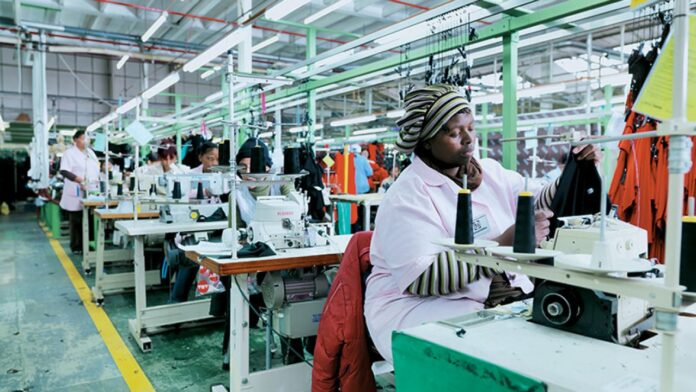It is no longer news that global macroeconomic fundamentals have been challenged by a myriad of issues since 2020, ranging from COVID-19 pandemic to food and energy crisis and the unabating Russia-Ukraine war.
Bringing it home, Nigeria currently battles both global and domestic challenges such as inflationary pressures, foreign exchange scarcity, weak consumer demands, tight monetary policy and electioneering.
The country’s overdependence on imports for critical components in sectors such as manufacturing, agriculture, has been identified as one of the reasons for the underperformance of these sectors.
As at the third quarter of 2022, manufacturing contracted by 1.9 per cent, textiles by 3.98 per cent, food and beverage by 4.05 per cent, plastics and rubber by 3.92 per cent, coal mining by 43.5 per cent.
Others are: crude oil and gas which contracted by 22.67 per cent, oil refining by 44.7 per cent and electricity and gas by 3.56 per cent.
All these, reflect the several headwinds that have stalled the manufacturing sector over the past few years.
In spite of the challenges, Dr Muda Yusuf, founder, Centre for the Promotion of Private Enterprises (CPPE), said the Nigerian economy demonstrated remarkable resilience in 2022.
Yusuf, setting the agenda for policy makers in 2023 to engender manufacturing sector growth, stressed the review of three key macroeconomic variables of inflation, foreign exchange, and Gross Domestic Product (GDP) growth.
He noted that cost of goods and services consumed by the average Nigerian accelerated between 50 to 100 per cent in 2022, further pushing five million Nigerians into poverty with a 35 per cent slump in purchasing power.
To tackle inflation, Yusuf stressed the need to address its key drivers by boosting productivity in the economy, stemming the naira depreciation, tacking foreign exchange illiquidity, addressing insecurity and minimising monetisation of fiscal deficits.
He also stressed the need to review trade policy to bring down the cost of intermediate products for manufacturers, fix climate change concerns, tackle cost of logistics, and address cargo clearing and other port challenges.
“As part of economic reforms imperatives to unlock growth and development for 2023, the government must undertake some urgent reforms.
“The enactment of the Petroleum Industry Act (PIA) was a major step towards the reform of the oil gas sector but we need to see greater commitment to the implementation of the PIA to unlock investments in the sector and end the perennial fuel scarcity.
“There is a need to also consolidate the power sector reform via the creation of an enabling environment to sustain current private sector investment in the sector and attract new private capital to the electricity sector.
“Urgent reforms are vital with respect to electricity tariff, metering and deepening of energy mix and we need robust incentives (fiscal and monetary) to boost private investment in renewable energy,” he said.
Yusuf also stated the need to mitigate the burden of taxation on businesses, saying that the current tax regime in the country stifled investments.
According to him, the current tax regime is in conflict with the National Tax Policy which prescribes that there should be less emphasis on direct taxation in order to incentivise investment.
“An economy that desires job creation, economic inclusion, investment growth and poverty reduction, should have an accommodating tax regime for investors.
“Corporate tax in Nigeria is 30 per cent, but effective corporate tax is much more than that with tertiary education tax of 2.5 per cent of profit; NITDA Levy of 1 per cent of profit; NASENI Levy of 0.25 profit of profit; Police Trust Fund Levy of 0.005 per cent of profit.
“This brings effective corporate tax to about 34 per cent making the rate one of the highest in the world.
“There are numerous other taxes imposed on businesses by the states and local governments and this multitude of taxes is crippling investment in the Nigerian economy.
“There is need for an urgent review,” he said.
Also, Lagos Chamber of Commerce and Industry (LCCI) tasked the Federal Government to sustain its targeted financial interventions in selected critical sectors like agriculture, manufacturing, export infrastructure and others to navigate successfully through 2023.
Dr Chinyere Almona, Director General, LCCI, said government needed to sustain such interventions to tackle insecurity and free more monies from subsidy payments.
She noted that government’s financing support to the agricultural sector could boost production, create jobs, and lower the spiking food inflation responsible for the rising headline inflation in 2022.
She added that the African Continental Free Trade Agreement (AfCFTA) provided huge opportunities to explore the African markets with Nigerian agricultural products.
The LCCI DG urged the Federal Government to scale up plans of establishing special economic zones where agro-processing activities would be supported to produce finished products for our markets and for export.
“With some of these challenges resolved, we expect to see a higher growth rate at above three per cent higher than the less than average two per cent recorded in 2022.
“For Nigeria, the base factors that may continue to drive the major economic indicators are the rising inflation rate, tight monetary policies, an unstable currency, foreign exchange scarcity.
“Others are debt burden, currency management, food supply disruptions, exchange rate volatility, and election spending.
“We urge the government to tackle oil theft to earn more foreign exchange, borrow from cheaper sources to reduce the burden of debt servicing, and pave way for the removal of the fuel subsidy by the incoming government.
“With increased spending by the government for census and general elections, the government must block revenue leakages, reduce costs, and empower the private sector to create jobs and generate more revenue to the government,” she said.
For economic development for Nigeria in 2023, Almona projected growth in sectors like manufacturing, agriculture, transport, telecommunications, and trade.
The experts have spoken, but will the Federal Government heed their call, by providing a conducive environment for the manufacturing sector, an invariably the economy to thrive?




